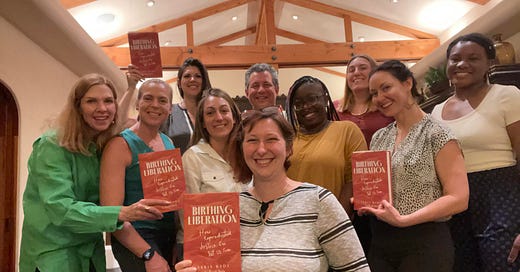Birthing Liberation: How Reproductive Justice Can Set Us Free
Sharing insights from our potluck conversation on Juneteenth with author Sabia Wade.
In a society deeply rooted in racial inequality, the journey towards liberation often requires each of us to make difficult choices. These choices can be especially complex for women who grapple with the intersectionality of their gender and race. At our Juneteenth: Spring Into Action for Reproductive Justice Dinner we were joined by writer, investor, and doula, Sabia Wade. We explored the difficulties faced by marginalized communities and the power dynamics that shape their experiences as well as the systemic inequality limiting access to capital and wealth building. Our conversation focused on the isolation of going against the status quo, the challenge of passing, the significance of community support, and the need for accessible healthcare funding.
Isolation: Choosing to Go Against the Status Quo
Sabia highlighted the isolating experience of challenging the status quo, particularly when advocating for birthing liberation. The oppressive systems and narratives ingrained in society can make it daunting for individuals to deviate from the established norms. Wade emphasizes that marginalized communities, especially Black women, often face significant backlash when seeking to redefine their birthing experiences and dismantle oppressive structures. However, she asserts that birthing liberation is about reclaiming autonomy, shifting power dynamics, and centering the experiences and voices of those who have been marginalized for far too long.
One of the most impactful experiences shared by dinner participants in reading the book was the powerful somatic integration practice that Sabia uses throughout her book.
“Birthing Liberation teaches us, not only how to understand our own trauma resulting from racism and our current systems, but also how to begin to heal it through somatic practices, journaling, and internal awareness, helping the reader access tools for healing that we already carry within ourselves.” - Sabia Wade
Our challenge is to dare to feel, cry, and compost the trauma from both our lived experience and the stories of inequity that we encounter. To deny those feelings is to be numb or blinded by rage and unable to advance a movement for liberation.
The Challenge and Opportunity of Passing
During our conversation, Sabia astutely pointed out the complexity of passing—the act of choosing to pick up or put down an identity. Non-BIPOC women face the challenge of choosing between embracing their womanhood or assimilating into whiteness to navigate societal spaces more comfortably. This constant negotiation of identity can be emotionally exhausting and mentally draining. However, Wade emphasizes the opportunity for growth and empowerment that comes from embracing one's true identity and unapologetically asserting oneself in the face of adversity. Non-BIPOC women are being called to be courageous—to stand together with BIPOC women at the risk of losing privilege, access, and safety—so that we can actually change the systems of oppression that mean even the wealthiest black women see higher infant mortality rates than the poorest white women.
Thanks to the NY Times for making this chart that just makes the insanity of this disparity blatantly obvious.
The Power of Trust and Community Support
Much of our conversation emphasized the importance of trust and community support in birthing liberation movements. Christie shared her work with Backstage Capital—an organization connecting capital with underestimated founders. She understands the transformative power of connecting individuals with shared experiences and providing them with the necessary resources to thrive.
Programs that support BIPOC investors
VC Include - Fund Manager Training
Angel Investing 101 - ClassRebel
VenCapital Fellowship - Learn about venture financing and grow your network
Accessible Healthcare Funding for Doulas & Midwives
One significant barrier to birthing liberation is the lack of accessible healthcare funding, particularly for doula organizations. Nicole & Sabia both highlighted the need for capital bridging to support doula organizations and enabling survive reimbursement through Medicaid. It may seem like a great thing for doulas to be covered by Medicaid but there are a ton of unintended consequences:
Medicaid payment schedules are wildly divergent from the time care is delivered. Most doulas can’t wait 6 months to get paid.
Medicaid wants to standardize what is offered which fundamentally undermines the very nature of doula care. Doulas create individualized and culturally competent care plans based on the specific needs of the person giving birth.
Also, in what world is labor standard? For some people it’s 4 hours, for others it’s 40 (or more)—yet Medicaid would want to offer the exact same reimbursement amount for both. And that’s just labor. It doesn’t include the variable hours of support before and after labor.
Nicole & Sabia both advocated for trusting community members with financial resources directly, as they are best positioned to understand and address the specific needs of their communities.
Calls to Action
BUY & READ Birthing Liberation
LEAVE A REVIEW ON Good Reads & Amazon
BUILD YOUR OWN SOMATIC PRACTICE to integrate composting of trauma and injustice into your own liberation activism






Thank you so much for having me <3